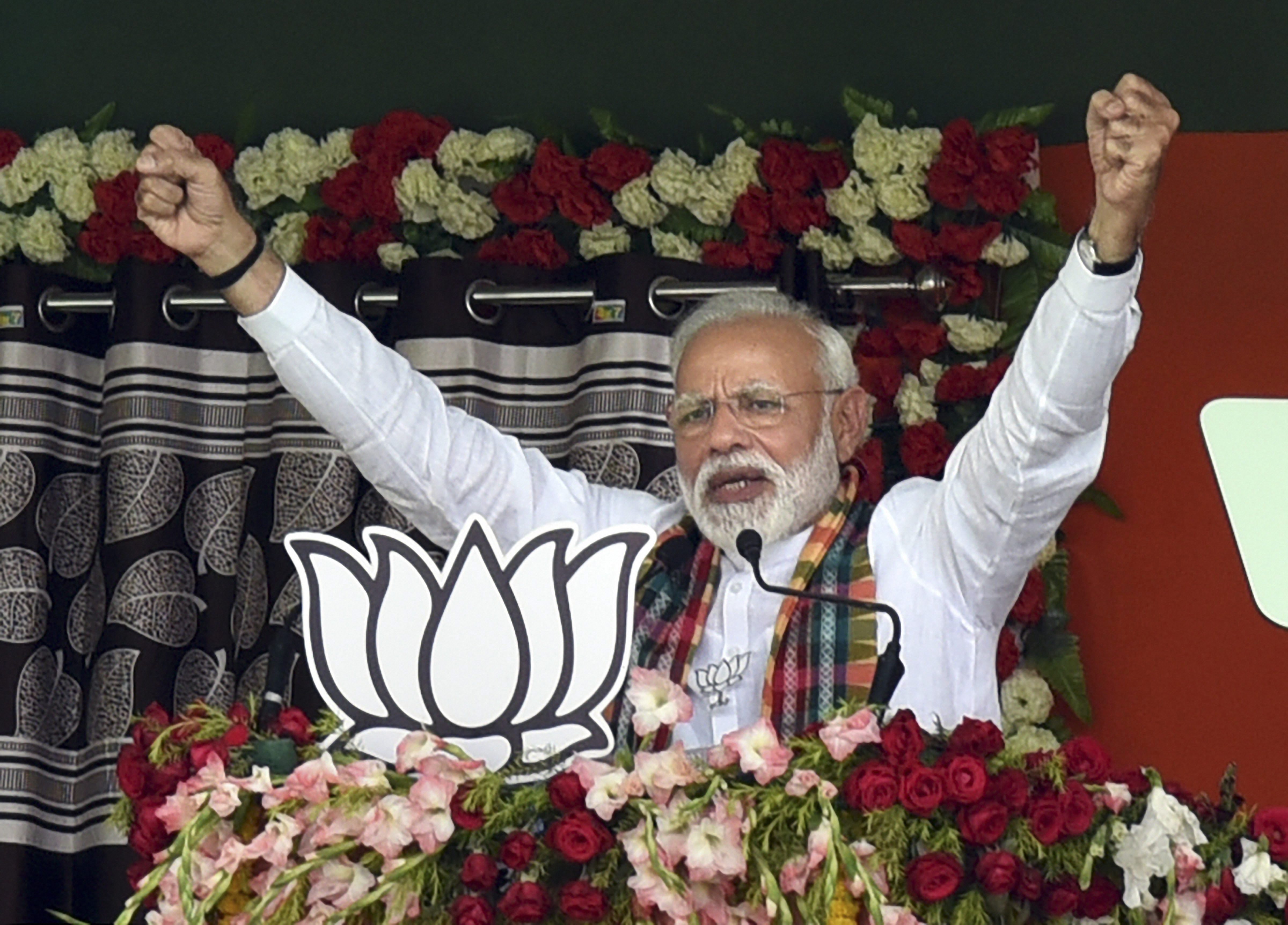
BJP manifesto: A khichdi of promises specially ordered for polls

The main chef of the BJP manifesto for 2019 has worked with a simple recipe. Mix four decades of Janasangh, five years of Narendra Modi and eight decades of Congress welfarism; garnish with nationalism, patriotism; spice up with jargons like ‘tukde-tukde elitism’; serve hot with a dash of Ram temple.
You would notice the BJP raided its entire pantry to cook its election special, leaving nothing behind. Not even minoritism — which is part of the menu as the BJP’s commitment to make ‘triple talaq’ illegal.
Some of the BJP promises — the ones that date back to its original avatar, the Janasangh — have been faithfully reiterated. The commitment to remove Article 370, the Constitutional provision that guarantees autonomy to Jammu and Kashmir, its offshoot 35A and the commitment to a Uniform Civil Code have been part of the saffron parivar’s agenda since Independence. In 1951, when the Janasangh released its first manifesto, full integration of J&K was one its salient promises. Since then it has made its way through every BJP manifesto.
Four years ago, when the BJP formed a coalition government in J&K with the People’s Democratic Party, it had the best opportunity in decades to fulfill the promise, and its own dream. But, the valley started resonating with chants of Maje hund azzat, bhene hund azzat, trehath satehath (our mother’s honour, our sister’s honour, 370). Sensing the mood in Kashmir, the BJP put Article 370 on the backburner. Now that it considers its coalition government as mahamilvat (impurity), the promise is part of the manifesto again.
It is not difficult to understand why the BJP cannot let go of Article 370. It knows nothing appeals to the common man south of Srinagar more than the call for saving Kashmir, correcting the “mistake” made by the Congress while signing the instrument of accession with the Dogra ruler of the state. Kashmir, the special rights to its citizens under 35A and the plight of pundits forced out of the Valley — about which successive BJP governments have done zilch — are the cornerstones of the party’s nationalist edifice. The party, in spite of its poor record on these issues, just can’t afford to not talk about it.
More so when it needs nationalism more than any other time in its history. Since the election has become a shootout between issues like nationalism, honour of the armed forces and internal security on the one side and unemployment, farmer distress and demonetisation, the BJP has to keep reiterating its ‘nationalist’ status.
Nationalism, like vikas (development) in 2014, is its USP this year. It has carefully replaced slogans like acche din (better days) and promises of jobs to youth. No wonder, phrases like Maha Shakti (super power), top six economies, the strongest nation in the world, zero tolerance towards terrorism, free hand to security forces and enhanced security budget were part of the election manifesto speeches by Amit Shah and Rajnath Singh. And to differentiate the BJP from rivals, Arun Jaitley even went to the extent of arguing that while other manifestos were hollow promises of nation breakers (tukde-tukde gang), the BJP’s was a sankalp (commitment) to a strong nation.
Its other promises are a mix of old and new commitments. Four years ago, the Prime Minister had vowed to double the income of farmers by 2022; build affordable houses for the Indian poor and build a Ram temple in Ayodhya. The BJP remains committed to these goals in spite of very little progress.
In the 1980s, a popular brand of detergent soap had come up with a popular marketing campaign, whose punch line was, “how is his shirt/saree whiter than mine?”. These days, since doles and waivers are the norm, parties often wonder how the manifesto of the rival promises more than theirs.
The spirit of competitive welfarism is visible in the BJP’s string of promises in response to the Congress announcement of ₹72,000 dole every year to India’s poor, loan waivers and easier norms for starting a business. The BJP too has promised cash assistance to all farmers in the country, pension for small and marginal farmers and pucca houses for every family.
Comparison with the Congress manifesto that promises NYAY (justice as well as minimum guaranteed income) are unavoidable. In essence, both parties promise more doles, more assistance to the Indian poor and rural families. But the BJP manifesto is a bit conservative in its approach — it treats individuals as an entity that thrives on sentiments like nationalism and religious identity and, thus, can be swayed by familiar slogans on Kashmir, Ram Temple, Uniform Civil Code and be mobilised by talking about fears, real or imagined, to the country because of its neighbours and immigrants.
The Congress manifesto, on the other hand, is a bit liberal in its approach with its commitment to civil liberties and human rights seen in its promise of reviewing AFSPA, restarting dialogue on Kashmir and abolishing sedition laws. The BJP’s sales pitch is of putting the nation’s interests above those of its individual. The Congress is ready to strike a balance, even at the cost of being called anti-national.

